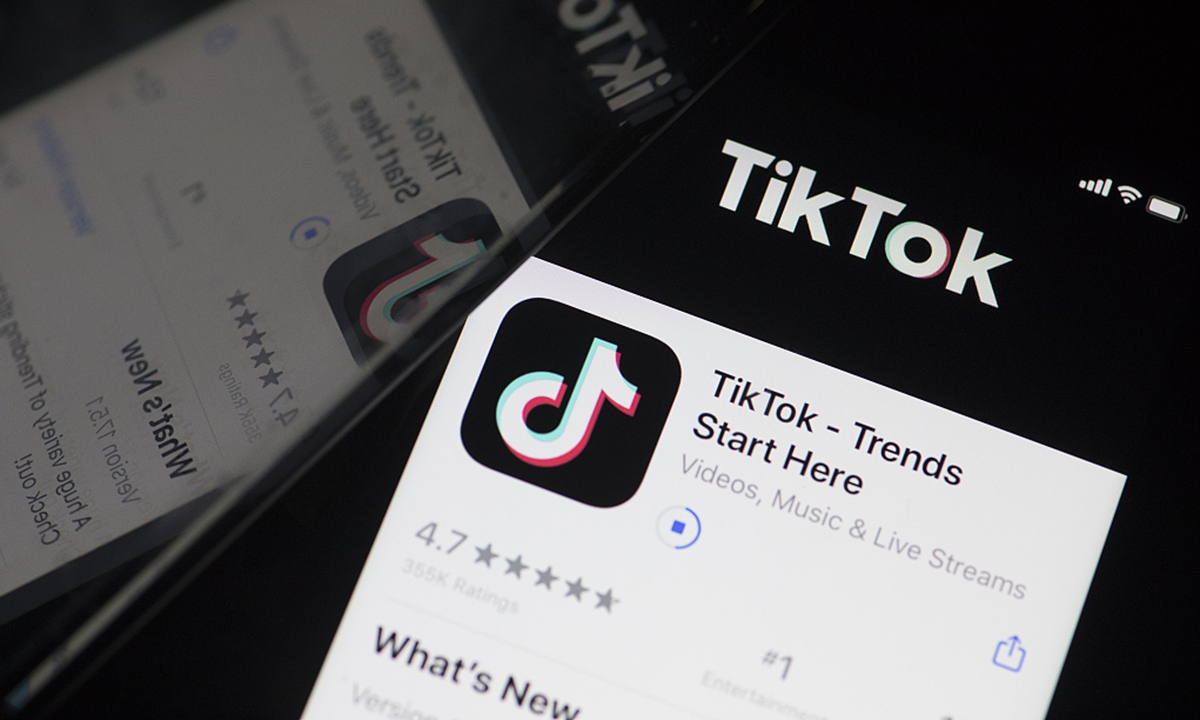China won't allow US to rob TikTok: expert
By Wang Cong Source: Global Times Published: 2020/9/22 21:28:40
Washington’s new tactic threatens Beijing’s tech future

TikTok. Photo: VCG
While Chinese officials have noticeably maintained public silence over the proposed restructuring plan for TikTok, there is an increasingly unmistakable signal from Beijing that it will not allow the US to rob one of the country's most globally successful apps so openly and unscrupulously, Chinese experts said on Tuesday.
For China, the wild hunt for TikTok's global operations by what appears to be concerted efforts by the US government, Congress as well as Silicon Valley has mounted to a whole new level of US' ill-attempt to contain China's technology rise - from sanctions and supply cutoff to seizure by force, which, if let go unchecked, could open up more Chinese firms for grabs, the experts noted.
Such an assessment may have been further confirmed by US President Donald Trump's back-peddling on his earlier approval on the deal that, ByteDance - TikTok's Chinese parent company - insisted, would give it a majority stake of 80 percent in the new subsidy TikTok Global and avoid giving cutting-edge technologies to the US firms Oracle and Wal-Mart.
Within 48 hours after giving "blessing" to the deal, Trump said in an interview on Monday that if the US companies "don't have total control, then we're not going to approve the deal" and that the Chinese firm would have "nothing to do with it and if they do, we just won't make the deal."
"Though this period of interaction, we have clearly seen that the US now has two tactics in cracking down on Chinese tech firms: The first is the so-called Entity List, under which the US cuts off supplies to Chinese high-tech firms; the second is to rob openly and unscrupulously," said Li Yong, deputy chairman of the Expert Committee of the China Association of International Trade, a think tank affiliated with the Chinese Ministry of Commerce (MOFCOM).
Such a realization was also behind China's reluctance to even comment on the new deal, let alone embrace it, which a clear indication that Chinese officials were not going to approve the plan, even before Trump walked back from his earlier approval "in concept," experts noted, adding Trump's reengaging just reaffirmed such a position.
China had three serious issues with the deal, including transfer of technology and concerns of monopoly, ownership of TikTok as well as the US firms in the deal, particularly Oracle's Larry Ellison, who is "definitely an anti-China person," said Mei Xinyu, a research fellow at the MOFCOM's Chinese Academy of International Trade and Economic Cooperation.
"That's problematic. That's why this deal was unlikely to get approved," Mei, who is also closely following TikTok's case, told the Global Times on Tuesday. "Don't count on this thing to be over anytime soon."
In light of the looming deal, the US Department of Commerce on Saturday announced that it was postponing a ban of downloads of TikTok that was planned to take effect on Sunday until at least September 27. It was unclear whether Trump's reengaging would change that.
However, even if it means TikTok could be shut down complete in the US, China will not sit idle and allow the US government to seize a Chinese asset so brazenly to send a clear message that it would do all it takes to protect Chinese interests, experts noted.
In case of TikTok, Chinese officials have vowed that it reserves the right to "necessary measures to safeguard legitimate rights and interests of Chinese companies." At the end of August, the MOFCOM also moved to add algorism behind content recommendation to a list of advanced technologies banned or restricted from export, essentially putting a check on Trump's plan to force the sale of TikTok to US businesses.
Chinese officials have also issued rules for its unreliable entity list that could blacklist and severely punish foreign entities, organization and individuals that harm China's sovereignty, security and development interest.
Though officials stressed that the mechanism was not aimed at any particular country or company, the move offers another powerful tool for protecting Chinese interests, experts said.
"Broadly speaking, this is no longer a simply issue about one business. Instead, it contains the dark hostility of Trump and his administration toward China's high-tech companies," Li said.
Posted in: ECONOMY